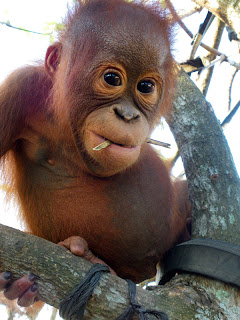 IAR volunteer Paloma Corbi tells us about the worrying condition of the latest baby orangutan to be brought into our centre.
IAR volunteer Paloma Corbi tells us about the worrying condition of the latest baby orangutan to be brought into our centre.A new baby orangutan arrived at the centre on 23 November. She is a female of about four years old and currently receiving round-the-clock intensive care from the vets Adi, Silje, Lusy and paramedic Rica. We have named her Butan.
Butan is infected with a malaria parasite (Plasmodium sp). It's possible that it could be the same malaria parasite that Rahayu was suffering from (a non-falciparum, non-vivax Plasmodium). The team hasn’t yet established the species of Plasmodium but they are doing further tests to investigate it.
The little orangutan is only 6.6kg which makes her extremely underweight (she should be at least 15kg). She is very malnourished and showing signs of some neurological issues. She's making a little slow progress but she's most certainly much better than when she arrived.












